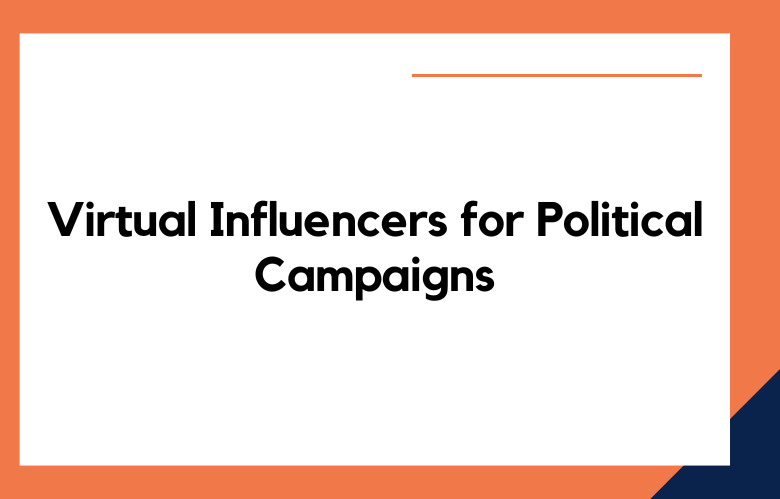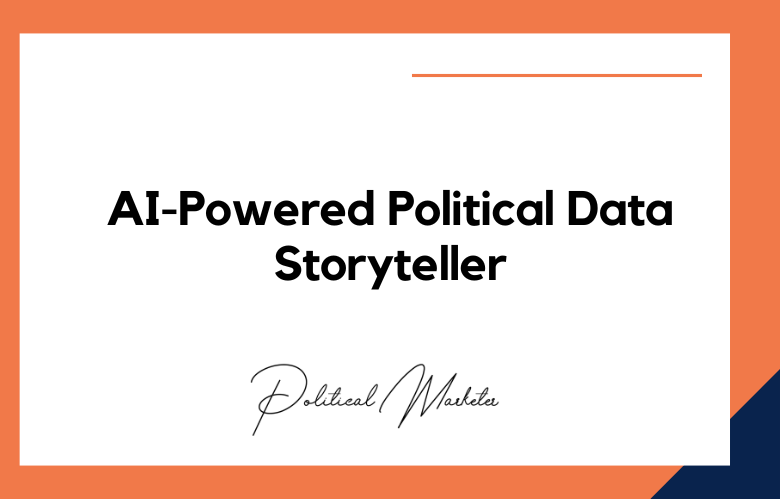In the ever-evolving landscape of political campaigning, virtual influencers are emerging as a novel and intriguing strategy for engaging voters and shaping public discourse.
Unlike traditional human influencers, virtual influencers are computer-generated characters that exist solely in the digital realm. With their lifelike appearances, unique personalities, and vast online followings, these virtual entities have the power to captivate audiences and influence opinions on a wide range of issues, including politics.
Virtual Influencers for Political Campaigns
In this guide, we’ll explore the concept of virtual influencers and their potential applications in political campaigns. From leveraging their reach and influence to mobilize support for candidates to use them as surrogates for delivering campaign messages, virtual influencers offer a new frontier in political communication and engagement.
As we delve into the world of virtual influencers for political campaigns, we’ll examine the benefits, challenges, and ethical considerations associated with this innovative approach. Whether you’re a political candidate looking to reach new audiences or a campaign strategist exploring innovative tactics, understanding the role of virtual influencers in modern politics is essential for staying ahead in the digital age. Let’s explore how virtual influencers reshape the political landscape and influence how we engage with politics in the digital era.
Leveraging Virtual Influencers in Political Campaigns: A Complete Guide
In the rapidly evolving arena of political campaigning, leveraging virtual influencers has emerged as a groundbreaking strategy to capture voter attention, amplify campaign messages, and shape public perception. Virtual influencers, often AI-generated personas with lifelike appearances and distinct personalities, have transcended traditional boundaries to become powerful agents of influence in the digital realm.
In this comprehensive guide, we’ll explore the multifaceted role of virtual influencers in political campaigns, offering insights into their potential applications, benefits, and ethical considerations. From mobilizing support for candidates to engaging with younger demographics and navigating complex policy discussions, virtual influencers offer a new frontier in political communication and engagement.
As we read this guide, we’ll examine the strategies, best practices, and case studies that showcase the transformative impact of virtual influencers in modern politics. Whether you’re a political candidate seeking to expand your reach or a campaign strategist looking to innovate your approach, understanding the dynamics of virtual influencers is essential for navigating the ever-changing landscape of political campaigning. Let’s journey to uncover the full potential of leveraging virtual influencers in political campaigns.
The Rise of Virtual Influencers: How They are Transforming Political Campaigns
“The Rise of Virtual Influencers: How They are Transforming Political Campaigns” explores the revolutionary impact of virtual influencers in the political arena. As digital creations powered by artificial intelligence, these influencers reshape traditional campaign strategies and redefine how political messages are disseminated and received.
This book details the emergence of virtual influencers—sophisticated, algorithm-driven entities designed to mimic human behavior and engage with real audiences across various platforms. It delves into how these digital figures, with their tailored appearances and personalities, are crafted to appeal to specific voter bases, thus enabling campaigns to target demographics with unprecedented precision.
The introduction sets the stage for a comprehensive analysis of how virtual influencers, as a novel and controlled messaging tool, offer political campaigns the ability to consistently communicate curated content without the unpredictability associated with human spokespeople. It raises crucial questions about the implications for authenticity and ethical considerations in political communication, paving the way for a deeper examination of their transformative role in modern electoral strategies.
Virtual Influencers vs Real Influencers: Which is More Effective for Political Campaigns?
In the evolving digital marketing landscape and public engagement, political campaigns continuously seek innovative ways to connect with voters. One of the more recent trends involves using virtual and real influencers to amplify messages and engage with broader audiences.
Virtual influencers, digitally created personas powered by artificial intelligence, have emerged as unique voices in social media. They can reach diverse demographics without the complexities associated with actual human influencers. On the other hand, real influencers—actual individuals with significant social media followings—bring authenticity and personal connections that can resonate deeply with followers.
Choosing between virtual and real influencers for political campaigns involves carefully analyzing the campaign’s goals, target audience, and the specific nuances of each type of influencer. While virtual influencers offer control and consistency free from human error or controversy, real influencers can leverage genuine relationships and trust built over time with their audience.
This choice significantly impacts the effectiveness of campaign messaging, voter engagement, and electoral outcomes. The question remains: Which type of influencer is more effective for political campaigns? This analysis seeks to explore the benefits and drawbacks of each, providing insights into how best to utilize these modern tools in political strategy.
Unveiling the Impact of Virtual Influencers on Political Campaign Strategies
Virtual influencers are becoming increasingly popular in the digital toolkit of political campaign strategies. These computer-generated figures, crafted with sophisticated AI technology, offer a unique blend of engagement capabilities that can shape and shift public opinion and voter behavior. Their rise marks a significant evolution in how political messages are communicated increasingly digitally. Here’s a detailed look at how virtual influencers are impacting political campaign strategies:
Strategic Flexibility and Control
Virtual influencers provide campaign teams with unprecedented control over messaging. Since they are entirely created and managed digitally, there is no risk of off-the-cuff remarks or personal scandals that could derail a campaign. This level of control extends to every aspect of the influencer’s presence, including their personality, appearance, and the exact timing and content of their communications. This can lead to highly tailored messages that resonate with specific demographic groups.
24/7 Campaign Presence
Unlike human influencers, virtual characters do not require rest and can engage with audiences across different time zones without pause. This constant availability allows campaigns to maintain a continuous presence on social media, potentially increasing engagement rates and strengthening message retention among voters.
Cost Efficiency
Although the initial development of a virtual influencer might require a significant investment in technology and creative design, they can be more cost-effective over the long term than human influencers. Virtual influencers do not require ongoing salaries, perks, or management of the personal needs that come with human counterparts, reducing overall campaign costs.
Reach and Engagement with Younger Demographics
Virtual influencers appeal to younger, tech-savvy voters who spend much time online and are accustomed to digital interactions. Their novelty and technological aspects can draw attention in a crowded digital landscape, making them practical tools for engaging with demographics that might be less responsive to traditional forms of political communication.
Customization for Targeted Messaging
The ability to customize every aspect of a virtual influencer’s identity and message allows campaigns to address niche topics or communities in a way that feels both specific and authentic. Virtual influencers can be programmed to speak different languages, embody different cultural backgrounds, and advocate for particular issues, enhancing the relevance and impact of campaign messages.
Ethical and Trust Concerns
Despite these advantages, virtual influencers pose ethical questions that can impact a campaign’s credibility. Their artificial nature can lead to skepticism and trust issues among voters, particularly around transparency and authenticity. Campaigns must navigate these challenges carefully, possibly by maintaining transparency about the influencer’s virtual nature and differentiating sponsored content from organic interactions.
Measuring Impact
The effectiveness of virtual influencers in political campaigns can be difficult to measure precisely. While engagement metrics (like shares, likes, and comments) can provide some insights, understanding the more profound influence on voter attitudes and behaviors requires sophisticated analytics and potential integration with other campaign feedback mechanisms.
Virtual Influencers: The Next Frontier in Political Campaign Marketing
In political campaign marketing, staying ahead of the curve is essential for capturing voter attention and driving engagement. Enter virtual influencers: the next frontier in political campaigning. These digital avatars, powered by AI technology, are revolutionizing how candidates connect with voters and convey their messages in the digital age.
In this guide, we’ll explore the emergence of virtual influencers as a groundbreaking strategy in political campaign marketing. From their ability to reach new audiences and deliver campaign messages with precision to their potential to humanize candidates and foster authentic connections with voters, virtual influencers represent a paradigm shift in political communication.
As we delve deeper into this topic, we’ll uncover the unique advantages, challenges, and ethical considerations of leveraging virtual influencers in political campaigns. Whether you’re a political candidate looking to harness the power of cutting-edge technology or a campaign strategist seeking innovative ways to engage with voters, understanding the role of virtual influencers is crucial for success in today’s digital landscape. Let’s explore how virtual influencers are reshaping the future of political campaign marketing.
Conclusion:
Utilizing virtual influencers in political campaigns marks a transformative shift in how political entities engage with modern audiences. These digital personas, engineered with cutting-edge technology and designed to resonate with specific demographic groups, offer unique advantages in consistency, control, and the ability to transcend traditional media constraints.
However, the employment of virtual influencers also presents significant ethical considerations. Campaigns must address the authenticity of messaging, transparency regarding their artificial nature, and potential manipulation of public opinion responsibly as we forge ahead into this new frontier. Political campaigners must balance innovation with integrity, ensuring that the use of virtual influencers supports a transparent and democratic engagement with the electorate.











